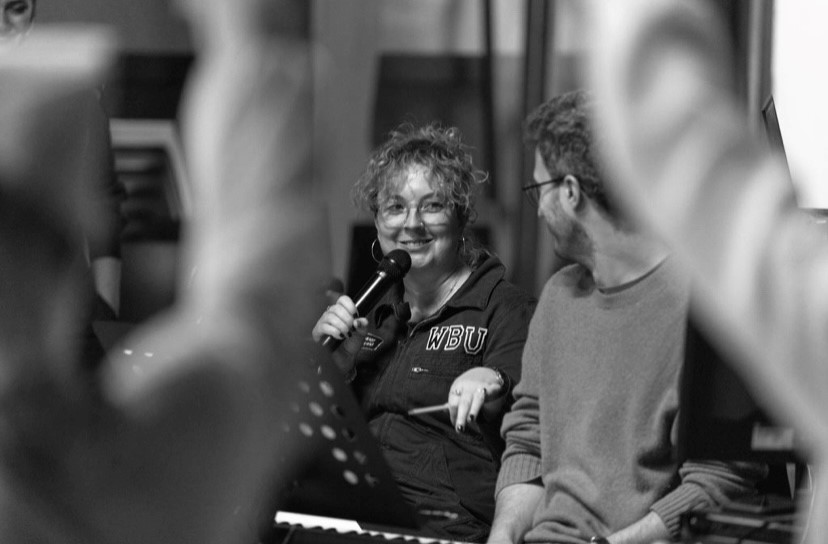
07 Dec A Sense of Direction – Franny Anne Rafferty
Assistant director. Associate director. Resident director. These job titles are familiar to anyone working in the performing arts industry. They have appeared in productions and programmes for decades and provided entry points into the industry for generations of emerging artists.
Despite this, though, there is scant structure in place to support these roles, according to director Franny Anne Rafferty, who has worked as both an associate and an assistant in recent years and currently runs an SDUK working group on the challenges facing the positions. There is not even, she says, a common consensus on what each role involves.
“There is little understanding about what an assistant director, or an associate director, or a resident director is expected to do,” Rafferty explains. “Often, those jobs get smushed together. Too often, people find themselves doing three jobs for the remuneration of one. Producers employ someone as an assistant director, then want them to take on the responsibility of an associate, or a resident.”
“There are agreements covering rates of pay and employment conditions for performers, designers and directors, but there is next to nothing for assistants, associates and residents, only a few lines here and there” she continues. “And that means that people in those roles are much more vulnerable to exploitation and abuse, underpayment and overwork, and all the ensuing problems that brings.”
***
Born in 1980, Rafferty grew up in the East Midlands, and fell in love with theatre on a school trip to see Stig Of The Dump at Leicester’s Haymarket Theatre. “The front rows got covered in a cloud of sherbet,” she remembers. “I thought it was magical, and I knew then that I wanted to work in theatre. I wanted to cover people in sherbet.”
Rafferty studied for a BTEC in Melton Mowbray, spent an unfulfilling few months at Rose Bruford College, before returning home “with my tail between my legs” to do a degree in Arts Management at Leicester De Montfort University. She subsequently worked in venue management in Birmingham, then in the West End, before sliding into producing at the Lyric Hammersmith, and eventually retraining as a director at the Royal Central School of Speech and Drama. “I came to directing the long way around,” she says, “but I got there in the end.”
Since graduating from Central in 2017, Rafferty has directed shows at the Bridewell Theatre, Camden People’s Theatre and Theatre503, and worked as an assistant and an associate on the UK tours of Turn Of The Screw, Titanic The Musical, and Spamalot. She is currently an associate director with Six The Musical in the West End – but her big ambition is to be an artistic director of a venue.
“I’d love to run a building,” she says. “And I’d love to run a building that really put its money where its mouth is, and always pays travel expenses, and always has time to chat to emerging artists about their ideas. I’d love to run a building that genuinely opened its doors to everyone.”
***
For the moment, though, Rafferty is concerned with improving conditions for assistant, associate and resident directors. She first approached SDUK about the issue in mid-2020, after the end of the first national lockdown. In July this year, the SDUK working group she co-ordinates met for the first time, and it has been meeting monthly ever since.
“There is about fifteen or sixteen people involved, and it is a real mixture of early-career, entry-level directors, right up to people who are international associates,” she explains. The group’s first job, she adds, is to “differentiate and define” the three roles.
“The conclusion we have come to is that an assistant director is the person at the director’s side, helping out with everything from research to tracking script changes, but without an expectation that they will lead a room in any way,” Rafferty explains. “An associate is someone that can take the director’s place when they are not around. They can lead anything from rehearsals to recasts. And a resident is someone that stays with the show after it has opened, and ensures it stays true to the director’s vision.”
The next task, Rafferty continues, is to come up with a code of best practice for producers, artistic directors, or anyone employing an assistant, associate or resident director – something without legal force, but that could provide employer and employee with a framework for rate negotiations and working conditions. And in the future, who knows? “It would be really, really good to see a standalone agreement on this,” she adds.
Rafferty is realistic. She knows that progress does not happen overnight, and that there will always be emerging professionals willing to accept less-than-ideal employment conditions for a chance to start making a name for themselves in the theatre industry. But she also knows that nothing changes unless people start talking about it – and that is what she encourages everyone working in the performing arts to do, whatever level they are at.
“Even if you have not yet reached the point as an emerging company or an early-career producer that you are able to have defined roles in the room, all being paid well, it is important that you have those conversations about pay and working conditions,” she concludes. “Because, in a few years’ time when you are at that point, you don’t want to be part of the problem.”
—
Franny Anne Rafferty was talking to Fergus Morgan for SDUK.
